TO OUR VALUED CUSTOMERS AT THIS DIFFICULT TIME
TO OUR VALUED CUSTOMERS AT THIS DIFFICULT TIME
For the first time in this generation, we are facing unprecedented challenges in regard to the global pandemic COVID-19.
As you know we are well placed to maintain and support your operations as our staff work from home and as such have been following the policies laid down by the government from day one in regard to reducing contact. To support this we have postponed our normal quarterly face to face “town halls” and have issued guidelines to our staff in relation to working from home during this difficult time.
This will not affect our service levels in regard to customer support services but may make training and professional services more difficult as this can require a face to face meeting.
Where possible all training and meetings will be carried out by our staff via the internet. The teams are highly skilled at this, having delivered many hundreds of hours of training in this manner. They have a number of different communication tools that they can use and therefore will be able to provide you access to meetings and training sessions with little or no technical challenges. The main issue is ensuring that you have the correct audio equipment, which would normally be a headset with a microphone or a conference telephone or just a telephone with access to a quiet office and a PC/laptop linked to the internet. If you need any advice on this please contact your account manager.
In regard to face to face meetings, as part of our policies, we have an onsite risk assessment policy and this has been enhanced to cover COVID-19 policy.
Before any face to face work on onsite visits can be authorised the request will be reviewed by a senior manager and a risk assessment carried out. This will include questions for yourselves that will cover the polices, the health status of your staff and the location where the meeting will take place. This information will be treated with the highest confidentiality and we do not need personal details just general information.
We will be contacting you on a personal basis to discuss your current situation, business continuity plans and to provide support and assistance with requirements that you may have in regard to home working, etc.
We will not need to change any communication methods as our systems are all cloud-based and as such requires no physical attendance to re-configure or support them.
Thank you for your understanding in this challenging time. We will continue to communicate on a regular basis with any updates and changes and look out for our Spring newsletter that will have additional contact details and an update on new functionality.

Image Credits: Creator: ffikretowCredit: Getty Images/iStockphoto
2019 – A Year in View
2019, has been a year of challenges for us all, GDPR, Making Tax digital and last but not least Brexit.
The Team at Metalogic have worked hard to make sure that these and other issues have had as little impact on their clients as possible and that has not always been easy as many of the changes have included legislation that has only been finalized at the last possible moment.
This has resulted in many long hours of software development and – a lot more than normally – updates to the system. The upside to this is the team has taken the opportunity to use these mandatory requirement updates to add many new modules to the iMetal application. We run feature on a new module once a quarter in our newsletters and many of you have taken the opportunity to let us know how useful this is and have gone on to contact their account manager for more information.
Examples of the last three newsletter modules have been, Counter Sales, Price Books and Bar Coding. In this edition, we provide some details on the “fabrication module” which will be of interest to any clients using multiple processes as part of their route to market.
If you wish to look at the enhancements that have been added to iMetal then copies of all release notes are available through the customer portal on the web site and can be accessed here. If you do not have a login or have forgotten your details please contact customer support.
Mind you it’s not been all about software change. The Metalogic team in conjunction with their colleagues in the USA, have flown over 63,000 miles consulting and implementing systems in places as far apart as Serbia, Shrewsbury, Toronto, and Slovakia with several hundred new users going live. Making all this happen using web-based software for project management, meetings, and training whenever possible to keep costs and environmental impact down.

Whilst the very nature of systems implementation means some time needs to be spent on-site and in face to face meetings, many of the tools developed during the move to web-based home working have significantly reduced the on-site time required benefiting the environment and saving clients money.
Next year looks just as busy and during the first quarter, the team will be implementing a 150 user system across Europe in nine different countries.
Later in the year, the first of the new web-based modules will be in beta test along with the mobile shop floor data recording systems being developed. Information on these modules will be made available through this newsletter initially so make sure you don’t miss out and add [email protected] to your contact list.
Main picture: Leigh Harrison, MD and Steve Baker, Research & Development Manager on a yellow metals distribution and processing site in Buffalo, New York State suitably equipped with PPE. Working with management and staff on business process improvement on their existing ERP system.
John Bear’s All for the Pituitary Foundation
John Padbury, General Manager with Metalogic Bear’d all last Friday at the company’s Christmas Town Hall meeting.
This wasn’t a long-held desire by John to get in touch with his bear side but all part of a fundraising effort for the Pituitary Foundation.
Metalogic are part of a number of companies owned by Jonas Software who’s chosen charity this year is the Pituitary Foundation and as combined group businesses have raised an amazing £20,000! This is great news for this relatively small charity aimed at improving the lives of those affected by disorders of the pituitary gland which although rare (around 70,000 patients in the UK) misdiagnoses are a common problem and some reports suggest that many more people could have an un-diagnosed pituitary issue.
- Bear-ly started
- Waiting for a train
- On the right tracks
- Arresting nature
- Long road
- Looks like he made it!
John got more than he bear-gained for when he challenged his team to come up with fundraising ideas and the more money raised the more ‘challenging’ the outfit was to be! Narrowly missing out on the Pikachu outfit John did take his fundraising seriously when nominated to ‘wear the Bear’ and was tasked to spend the day in it, from the moment he left the house to his arrival at the Hyatt Regency on Broad Street, Birmingham and throughout the day as he delivered and chaired the meeting! There were some interesting encounters along the way as the pictures show.
John would like to say Many Thanks to all those who donated, it really was much appreciated. If you feel so inspired that you would like to add to John’s fundraising efforts for this extremely worthwhile cause then please do visit his Just Giving page.

The Metalogic team also supported Christmas Jumper Day at the same meeting raising money for Save the Children’s Christmas Jumper Day with the winning ‘Reinbeer’ jumper being sported by Neil Webb, Customer Support Team Leader.
iMetal Fabrication Module
The iMetal Fabrication module provides value-added processes with the ability to quickly and accurately quote and sell fabrication jobs. Most shapes or items that can be defined by an equation can be quoted effortlessly. In addition, the quote can automatically include multiple predefined charges for inside or outside processing, freight, etc.
Features
- Create “fabrication” codes to determine shapes that can be defined by an equation, (e.g. circles, rings, ring segments, rectangles, cut-to-length items, etc.), and then use the ‘fab’ codes to quote/sell these items in the Order Entry and Quotation modules. Fab codes can also accommodate factors like kerf, test parts, etc.
- To request fabrication variables e.g. Circle Diameter, Ring Inside Diameter, Drilled Holes, Chamfers, etc Other values can then be calculated e.g. Processing time, Total cutting length, Scrap %, etc
- User-defined sales item descriptions can be generated, can also be used on Process Requests, calculate estimated processing times and add further costs/charges to the sales item
- Multiple Costs and Charges can be calculated and created for each fabrication code
- Create value-add “charge” codes (e.g. sawing, burning, freight, etc.) which can automatically or manually be factored into the selling cost and price of the fabricated parts. These charges can utilize user-defined tables which consider factors like thickness, diameter, linear inches, number of cuts, and so on. In addition, charge codes can have their own ledger accounts for financial reporting.
- Whenever a “fab” code is utilized, the forms (e.g. sales order, invoice, etc.) programs can print the fab code description, (e.g. 1″ HR Plate, 4″OD x 3″ID Ring Segment), and the quantity and weight of the fabricated parts.
BENEFITS
- Save time, eliminate miscalculations and oversights, and improve customer service by swiftly and accurately quoting fabricated parts.
- Improve value-add profitability by automatically including all factors (e.g. material, inside and outside processing, freight, skid charges, etc.) that contribute to the actual cost of a fabricated item.
- Evaluate the profitability of your value-add activity by utilizing available report generating tools to create financial reports on each charge code.
- Significantly decrease inaccurate quotations due to manual miscalculations, and/or failure to consider all relevant internal and external costs on fabrication orders.
- Streamline the process required to create the quote and turn it into an order
Interfaces
- iMetal Fabrication is integrated with the Stock, Quotations, Order Entry, Purchasing, and General Ledger modules.
- Value-add activity created through the fabrication module can be analyzed with the standard iMetal reporting tools, and/or Jasper Reports.
Nigel puts his Best Foot Forward for the Pituitary Foundation
Nigel puts his best foot forward for the Pituitary Foundation
PS Consultant Nigel Johnson has every reason to feel proud as he managed to complete the Edinburgh Marathon earlier this summer, whilst raising money for the Pituitary Foundation, despite it not going to plan!
Having started training at the beginning of January Nigel was on track until early April.
A week after completing an 18 mile run, pain struck in his right foot, he was told it was Plantar fasciitis and that there is no cure other than rest.
Feeling confident he could complete the marathon after 2 months rest, he stood at the start line with his brother-in-law Michael Baker.

He ran the first 9 miles okay until plantar fasciitis returned on his right foot and although he managed to run/walk the next 9 miles his foot became too painful to take the pounding so he frustratingly walked the last 8.2 miles.
Although this resulted in his slowest marathon yet at 5 hours and 54 minutes, on the plus side he got a lovely suntan!
Nigel said ‘Due to my tracker not working, my family had no idea where I was, so sadly nobody saw me finish – they were in the lost & found tent trying to find me!’
Nigel is still determined to run a marathon in under 4 hours and is planning the next one once he is cured of the plantar fasciitis; however he still raised a commendable £486.20.

The well earned finishing shirt!
Brexit – Its Potential Impact on Systems & Companies In The Metal Distribution Chain
BREXIT – IT’S POTENTIAL IMPACT ON SYSTEMS AND COMPANIES IN THE METAL DISTRIBUTION CHAIN
What Does It Mean To Me?
With the confusion and inaction that has surrounded the decision by the British people to leave the European Union, it would be unreasonable to say that as a company Jonas Metals and its subsidiary in the UK Metalogic has covered all the bases and potential requirements. Rather than attempt that this document reviews some of the known issues, that will apply if we leave with no deal – it covers what we as a company have done to our systems to provide solutions to potential issues. We have also provided links to sources of information that you may wish to access to ensure you are as prepared as you can be for this unique event.
Life outside the single market & customs union
The following list is not exclusive but it covers the main changes that will take place following our exit subject to any negotiated agreements.
• Goods will not circulate freely
• A border will exist between the UK and the EU
• Customs documentation will be required
• Goods will be checked
• UK manufacturers will need to prove the UK origin of their goods
• The UK will set its own tariffs
• The UK to negotiate its own trade arrangement
Why are these facts important? Well, the impact of Brexit on the UK metals sector could be significant due to a number of factors.
The dependency of the UK on imports and the application of Tariffs.
Looking at two of the main distributed products Steel and Aluminum we can see the dependency the UK has on imports and how this may grow.
STEEL
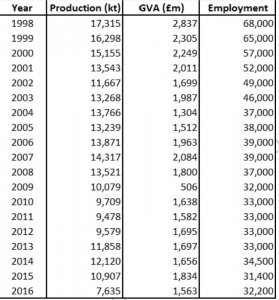
With the reduction in the capacity of “home” production, the uncertainty of the ownership and future of “British Steel” and other UK plants, imports of steel are likely to continue to grow as the capacity of the UK steel sector has reduced over the last two decades. Between 1998 and 2016, production has fallen by 56 percent, GVA has fallen by 45 percent (in nominal terms) and employment has fallen by about 53 percent as can be seen from the table.
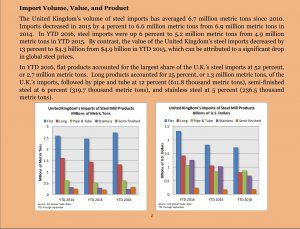
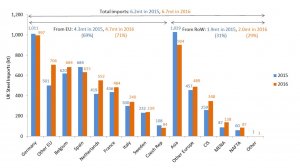
Trends in Production.
The latest reliable figures for imports confirm this and show the UK’s reliance on overseas suppliers.
If we look at these numbers broken down by source we can see the reliance on European Trading partners.
ALUMINIUM
Primary aluminium output has fallen substantially in recent years. There is only one remaining primary smelter in the UK. All other operators in the UK aluminium production industry are secondary producers that re-melt scrap aluminium. The UK aluminium production industry is heavily exposed to both shifts in demand from downstream markets and changes in the global price of the commodity. This exposes the industry to international developments, namely global economic conditions which play a key role in determining the demand for aluminium and its price. International economic difficulties have made recent years difficult for aluminium producers. However, world aluminium consumption is expected to grow strongly over the next five years, supported by demand from a number of emerging countries. Environmental regulation could continue to place cost pressures on the industry.
| Year | Number of enterprises | Total turnover (£m) | Approximate gross value added at basic prices (aGVA, £m) |
| 2008 | 183 | 2,427 | 474 |
| 2009 | 166 | 1,424 | 129 |
| 2010 | 161 | 1,745 | 375 |
| 2011 | 144 | 1,589 | 300 |
| 2012 | 138 | 1,263 | 129 |
| 2013 | 131 | 1,370 | 218 |
| 2014 | 129 | 1,284 | 286 |
| 2015 | 127 | 1,295 | 266 |
| 2016 | 127 | 1,413 | 275 |
With these pressures and the reduction in capacity, relationships with importers and overseas suppliers will become increasingly critical for distributors in this sector.
TARIFFS
We have already seen a round of tariffs applied by countries imposed as countervailing duties to offset the effects of subsidies made to producers of the goods in the exporting country, (USA China for example).
With our exit from the EU and in the absence of a preferential trade agreement, goods imported into the EU from non-EU countries must pay a tariff. Tariffs are custom duties levied on imported goods. Under WTO Most Favoured Nation (MFN), a country’s tariff schedule must be consistent for all countries it trades with, except those where a preferential trade agreement exists. EU MFN tariff rates vary depending on the goods. Currently, the EU imposes 0 percent Most Favoured Nation (MFN) tariffs on all semi-finished and finished steel products. However, the picture is more varied across the end goods which steel products are processed into, and some of these have non-zero MFN tariffs. The EU’s simple average of MFN applied duties is 2 percent across all metals and minerals, and 4.3 percent for transport equipment.
Tariffs can also be used for trade defence purposes. This includes temporarily increasing tariff rates to restrict imports of specific goods deemed to be injuring domestic production due to ‘dumping’ by a third country at below normal prices. For example, in 2016 the EU determined that steel from China was being exported to the EU below market price. The EU applied a 74 percent tariff to this Chinese steel to ensure EU producers were able to remain competitive.
Some Facts Relating To Tariffs
You will need to pay trade tariffs on some goods if you’re moving them to or from the EU.
All imports or exports (including UK imports) must be declared to HMRC using an international commodity (tariff)code.
You’re legally responsible for the correct tariff classification of your goods.
Once your goods have the correct tariff code you can work out the correct duty you need to pay on the import or export of your good.
Information Technology Systems.
The potential increase in the number and types of Tariffs that may be applied mean that Information Systems have to be able to handle subsidies and discounts in a whole new way.
Never before in the UK have we seen a potential requirement of this level and it has required a significant amount of work on behalf of the development team to add flexibility into the iMetal system to handle the potential requirements that may arise.
To ensure we covered all the bases in our last newsletter we surveyed 300 clients to assess how many were using tariffs and commodity codes. The response we got was not particularly great but we believe that this is more down to the lack of clarity in regards to the potential issues rather than clients not using or needing to use tariffs or commodity codes in the future (hence this article).
The problem is no one really knows what will be required as we are heading into unknown territory. However, the software takes time to be specified, developed and tested therefore we cannot wait for negotiations to be completed or Governments to decide if a Tariff needs to be applied or not.
So with this in mind, we appointed a number of our team to attend Brexit briefings at steel associations, board of trade and other sources of information to gather as much data as possible that could then be applied to ensure your software is as ready as it can be to handle the changes that we will see over the coming months.
Actions You Should Take
Importing & Exporting
Most of you will be aware of the steps you should have taken or be taken to allow your business to continue to trade after Brexit. We have outlined a list of activities on our dedicated Import/Export page and broken this up into a number of areas, Import-Export, business issues to consider and data protection. We have not attempted to provide all the answers but to raise questions (and some guides and information) that hopefully, you will already have considered.
Brexit Business Issues to Consider
Whilst not exclusive some of the items on this list may apply to your business and in some cases require us to help with configuration of your iMetal system and its data. Please contact your account manager for further information.
- Contracts and Commercial disputes
- Intellectual property rights
- Ireland and the Common Travel Area
- Company formation and company officers
- UK nationals living in the EU
- GDPR.
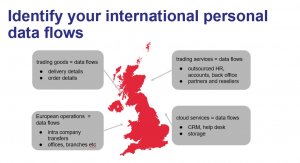
Data Protection and a No Deal Brexit.
GDPR will continue to apply in domestic law. This will mean that the requirements you put in place in relation to websites, cookies, storage of data and disposal will still apply and in some cases become intensified. Under a No-Deal, it’s unlikely that the EU will treat the UK the same as before.
There will be no changes to domestic standards or the rights of UK data subjects
Action will be needed to avoid disruption to international data flows. If you have EDI or other electronic interfaces in place consider the implications. Storage of clients’ personal details and financial information may need to be reviewed
This may particularly apply if you have employees working for you in European countries or European citizens working here. Consider Personal data includes names, physical and IP addresses, HR data and payroll details.
You may not know them all so check where data is being stored on your behalf?
ICO Guidance
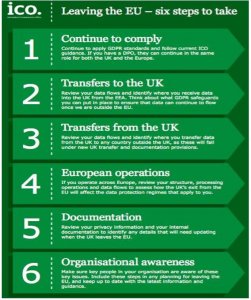
Finally
We are all operating in the dark at the moment in relation to what Brexit will actually mean.
The Team at Metalogic have worked hard to ensure that we have as many of the known issues covered (and some of the unknown ones as the best guess) but if you have any concerns or need to discuss issues that you feel are unique to your business please do not hesitate to contact your customer service team or account manager.
IMPORTING & EXPORTING POST BREXIT
Post Brexit Importing & Exporting – Actions You Should Take
Most of you will be aware of the steps you should have taken or be taken to allow your business to continue to trade after Brexit. The list of activities below is broken into a number of areas, Import-Export, business issues to consider and data protection. We have not attempted to provide all the answers but to raise questions (and some guides and information) that hopefully, you will already have considered
But just in case her are a few reminders. The actions below apply just as much to importing as they do for the export examples listed.
- Register for an EORI Number
- You need a UK issued Economic Operator Registration and Identification (EORI) number to import or export goods
- An EORI number will allow you to trade goods in and/or out of the UK
- Submit customs declarations
- You may need to add the country of origin onto your despatch paperwork
- Apply to be authorised for customs simplifications and procedures
- Check your importer has an EU EORI number
- Your importer will need an EU EORI number.
- You’ll need to get an EU EORI number if you’re exporting to your own business within the EU. You can get one from the customs authority in any EU country.
- If You are exporting Decide who will make the export declarations
- You can hire someone to deal with customs for you, or you can do it yourself.
- Decide if you want to export your goods using transit
- You may be able to use the Common Transit Convention (CTC) to simplify how your goods pass through customs and when your importer pays customs duties.
- Check the rate of tax and duty for your goods
- Your importer will need to pay tax and duty on your goods after Brexit. This will depend on the classification of the goods.
- Check what you need to do for the type of goods you export
- Many of our clients carry a range of goods and there might be other things you need to do, depending on what you’re exporting.
- Find out how changes to VAT will affect you
- Find out how you’ll claim VAT refunds from EU countries
- Find out how you’ll pay VAT if you sell digital services to EU customers
- Decide who will transport your goods outside the UK
Check with your Metalogic Account Manager if you are unsure about your software version being compliant and or any specific trading requirements you have. Further information on potential impact Brexit can have on tour systems & companies can be found here.
New Functionality – Counter Sales
iMetal New Functionality – Counter Sales
Many metal distribution centres have a requirement to process cash or credit sales from a formal sales counter environment. Historically this is implemented using standard iMetal functionality, which requires the production of picking and dispatch notes making the counter sales process longer than it could be.
iMetal has been enhanced with two new modules, the counters sales module and sales order invoicing.
Counter Sales What Does It Do For Me?
This functionality provides the option to record the payment details at sales order entry and produce the sales invoice upon completion of the order without having to force the order through the dispatch modules. This makes the flow is slick and efficient, which is needed in a counter sales environment. The module also has the facility to be interfaced with cash registers.
If material does need to be delivered, payment can be recorded in advance and the order pushed into the standard delivery processes. The same flexibility exists should the material need processing before being collected (or delivered).
“Cash On Delivery” flows are also supported in this module, with the system ensuring that the appropriate payment has been made before the transactions are allowed through to the finance system.
Functionality Includes
- Set customers to default as counter sales customers
- Define controls regarding minimum payment percentage for counter sales customers in order to release cash sales orders.
- Maintenance of cash registers allowing companies to define which users are allowed to to raise point of sale orders and make payments against them.
- Ability to select customers when recording cash sale by the customer telephone number
- Ability to print a sales invoice before completing the sale
- Facility to record payment details for the counter sale, of various types (e.g. “Card”, “Cash”, “Paypal”, etc.)
- Enforce a minimum deposit / payment percentage (which may be 100%) on a customer-by-customer basis
- Production of Sales Invoice and Posting to the accounts system without having to produce despatch documentation
- Interfaces to cash registers
- Enhanced sales enquiries to list counter sales and outstanding monies
- Enhanced sales reports to list counter sales and outstanding monies
- Reconciliation reports to aid the daily till reconciliation processes
For more information please contact your customer services team.
Built by JMB Creative









